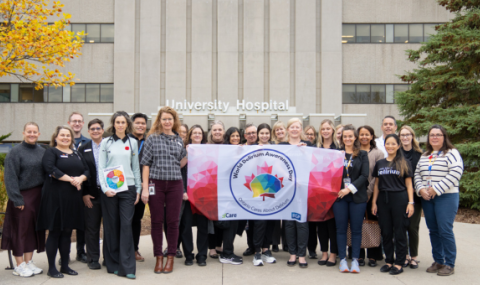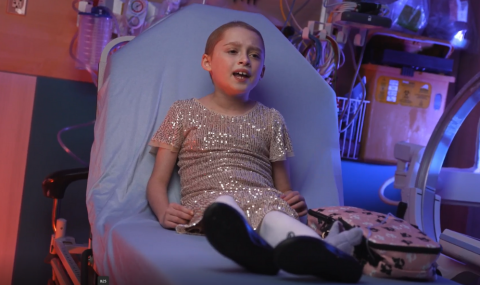GAAMHS services are designed to serve the following populations
- Recently discharged LHSC mental health inpatients;
- Patients being served by other in-hospital treatment programs;
GAAMHS treatment services include:
Team Model
Non-urgent Team-based service:
This service provides assessment and treatment for non-urgent referrals. The approximate wait-times are 3-4 months. The goal of a multi-disciplinary team-based model of care is to offer patient centered care as per the needs of the patients. Each team consists of a couple of psychiatrists, a social worker, a nurse and an occupational therapist. The patient may be assessed first by a clinician or a psychiatrist depending on the needs identifies in the referral form. All clinicians are trained to complete a standard mental health assessment. The teams meet every one to two weeks for review of the assessment details and joint determination of treatment needs. The care plan may include review by the psychiatrist, and/or, referral to group therapies available under GAAMHS and/or referral to resources in the community and/or limited number of 1:1 sessions with the clinician. Each patient has a care plan review every 3 to 6 months to assess their progress.
Through implementation of the Team-based Model of care there is a cultural shift in terms of clear expectation to discharge patients back to primary care within 6-12 months and rapid re-engagement with the same team if re-referred. This helps sustain access and flow thus providing timely services to new referrals. Patients are provided with the most up-to-date list of resources for counselling available in the community as well as self-help websites and books. It is also our goal that clear discharge guidance is provided to referring physicians and patients.
Urgent Consultation Service
Mandate: To provide a timely response to patients in need of urgent (not emergent) mental health assessment whether referred by family physicians, the Emergency Departments at LHSC, and SJHC Urgent Care Clinic.
Who We Serve: Patients age 18-64 who reside in London and Middlesex County.
How to Refer: Referral must be faxed by your family physician or a physician from a Walk-In Clinic with a Coordinated Intake referral form completed. Self-referrals are not accepted. Coordinated Intake personnel will then triage to the appropriate service, i.e. Urgent Consultation Service.
Limitations: We are not able to conduct custody and access evaluations. We are not able to conduct capacity or forensic assessments
Service Provided: Mental health assessments are conducted by nurse case managers and psychiatrists. Medical students, residents and other trainees may also be involved in delivery of services, under supervision of the consulting psychiatrist. Provisional diagnoses and recommendations for treatment will be made at the time of assessment, and may include a referral to hospital programs and/or community resources. Summary of consultation is faxed to the referral source on day of assessment with subsequent detailed dictation to follow.
Brief intervention (up to six sessions) may be warranted/offered through the Urgent Consultation Service, and may involve psychosocial and pharmacotherapeutic measures. However, there may be no further involvement necessary after the initial assessment.
Service Available: 8:30 am to 4:30 pm, Monday to Friday
How to reach us:
Mental Health Care Program
London Health Sciences Centre
800 Commissioners Road East
London, ON N6A 5W9
Telephone: 519-685-8500 Extension. 75521
Cognitive Behavioural Therapy (CBT)
Service Overview: CBT is a here-and-now focused treatment designed to teach skills to challenge and make changes in the patterns that perpetuate depression and anxiety. The CBT program provides group treatment for primary mood and anxiety disorders and is not suitable for individuals looking for supportive or more passive approaches. Treatment utilizes behavioural activation, cognitive restructuring and exposure techniques. Participants are expected to participate in group discussion and complete homework activities and exercises designed to assist with the progressive learning and application of strategies.
Please note that all treatment programs operate on weekdays 9:00 a.m. to 4:00 p.m.
Referral and engagement process: Patients are referred by a physician to the outpatient mental health program (via the Centralized Access Point). Once the patient attends an assessment, the referral is forwarded to the CBT team. The patient is scheduled (via phone call) to attend a first CBT information session. This session also allows for collaboration between the patient and the team therapists in developing a treatment plan. If group CBT and the program’s content is expected to be helpful for the individual he or she progresses to one of the following initial treatment groups: Depression or Anxiety. Once a client has completed one of these groups additional treatment may be available for Depression, Anxiety, Bipolar Disorder, and Obsessive-Compulsive Disorder.
Inclusion/Exclusion Criteria For CBT: Individuals meeting DSM criteria for anxiety and/or mood disorders (panic disorder, social anxiety, generalized anxiety disorder, specific phobias, obsessive compulsive disorder, major depressive disorder, bipolar disorder).The individual’s anxiety or mood disorder is primary and not a result of underlying issues such as affect dysregulation, unresolved trauma, substance use issues, extreme distress, grief, chronic pain, a medical condition, or a head injury. Individuals must be willing and able to participate actively in time limited, skill-based group interventions. This includes group discussion as well as homework activities designed to assist with the progressive learning and application of strategies. Individuals must commit to consistent attendance during business hours. Individuals must have specific goals for change and be willing to begin to experiment with thinking and behaving differently to reach those goals. Not suitable for individuals looking for supportive or more passive approaches. Able to read and process English language. Individuals are not actively psychotic. Individuals must be able to contract for their own safety.
Dialectical Behaviour Therapy (DBT)
Service Overview: Prior to commencing the DBT program, all individuals referred to the program are required to complete a mandatory four-week (two hours, once a week) introductory group which determines commitment and suitability for the DBT program. Many of the patients seen in the introductory meetings could benefit from Dialectical Behaviour Therapy (DBT).
In the introductory group, patients are provided with specific information about DBT, learn and practice DBT-related skills, and trial the demands that participation in the DBT program would place on them. If at the end of the introductory sessions, it is evident that an individual patient will benefit from other treatment modalities, the patient will be referred to alternative appropriate mental health care resources.
The LHSC Dialectical Behaviour Therapy (DBT) outpatient program serves adults (aged 18 to 64 years old) with multi-disordered mental health conditions who have significantly impaired functioning in multiple life domains, including significant and complex difficulties with affect management, interpersonal regulation, and behavioural dyscontrol (chronic suicidal behaviours; self-injury behaviours).
DBT patients typically also present with several co-morbid diagnoses such as mood disorder, post-traumatic stress disorder, anxiety disorder, substance use disorder, and eating disorder. The standard DBT modes of therapy offered in the service includes group skills training, with some individual psychotherapy (determined on a case-by-case basis), to help people learn and use new skills and strategies to develop a life that they experience as worth living.
Four skills training modules are taught in the group and include skills to:
Identify and describe emotions/change unwanted emotional responses/increase positive emotions (emotion regulation). Tolerate emotional distress when change is slow or unlikely (distress tolerance). Increase assertiveness skills while maintaining relationships and one’s self-respect (interpersonal effectiveness). Control attention to skillfully participate in the moment (mindfulness skills).
These interventions are implemented in a 26-week skills training group (two hours, once weekly) to help people make positive changes in their lives and enhance skills capabilities.
Referral process: Patients are referred by a physician to the outpatient mental health program (via the Centralized Access Point).
Track to Wellness Skills Group
Service Overview: Track to Wellness (TTW) is a 12-week (one session per week) outpatient group-based program for individuals ages 16-64 who are experiencing difficulty with managing mental health symptoms and meeting the demands of their daily lives.
TTW was designed from a framework of self-management and self-empowerment. It is a skills-focused group that includes psychoeducation-based sessions about the following areas of health and wellness:
Mindfulness, Basic activities of daily living, CBT, ACT, and DBT-informed skills, Relapse prevention/staying healthy
Comprised of nurses, social workers, and occupational therapists, the TTW team aims to support those who attend group to improve their self-management skills, to maximize their current level of functioning, and to meet their individual goals. Limited individual support and case management is also provided while in group to support skill acquisition and the transition out of group upon completion.
Referral and engagement process: Community referrals are accepted from primary care (family physician/nurse practitioner) through our Centralized Access Point. An intake interview with a member of our team is mandatory prior to taking part in the group program. Clients require coverage by an LHSC psychiatrist during their involvement in the group service.
Suitability Guidelines for Track to Wellness Group: Clients referred to TTW are required to have stable housing arrangements. They must not be currently abusing alcohol, prescription or street drugs. Group members are responsible for maintaining their safety outside of group hours. They must be comfortable in a group setting.
Clients must be willing and able to complete written homework activities, as well as engage in skills practice outside of group. Clients must be available to attend group during regular business hours (9:45 a.m. to 11:45 a.m. or 1:45 p.m. to 3:45 p.m.).
How to contact GAAMHS
- Your family doctor or walk-in clinic are able to access and/or contact the Centralized Access Point for Adult Ambulatory Mental Health Services on your behalf. They may make a referral by completing a referral form with a comprehensive history summary and faxing it to the Centralized Access Point for Adult Ambulatory Mental Health Services.
- Self referrals are not accepted.


